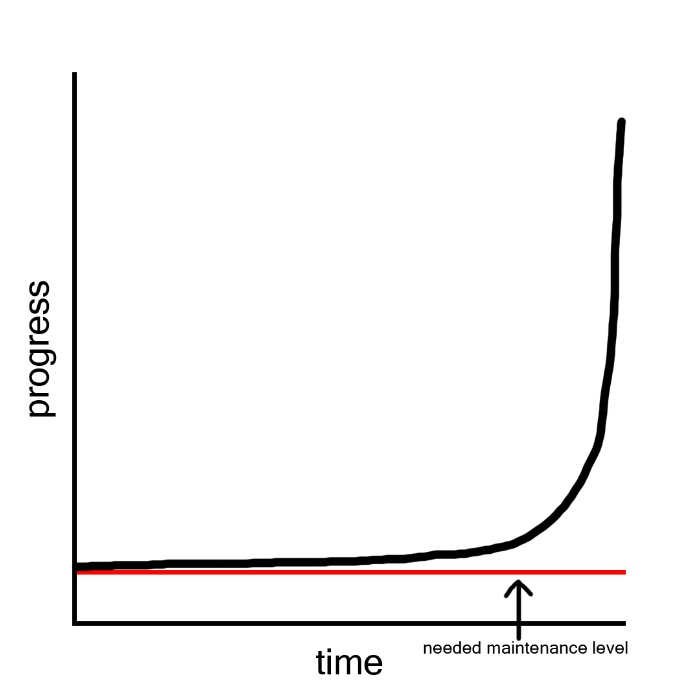I believe one of the most harmful principles we hold today is that of ultra-progress. That if we aren’t progressing in one way or another every single day, every single minute, that is a waste of time, a waste of life. I’m mainly talking about technological progress here. What time as humanity do we have to not progress? What sense does it make to have all of this disposable and amazing technology now if we aren’t going to progress?
Everyday, people must spend time cooking, cleaning, doing their laundry, cleaning the house, cleaning the dishes, put away their clean laundry, brush their teeth, exercise, and many more activities that can be seen as maintenance rather than advancement. That is, the activity maintains the status quo of everyday life, of normalcy. On average1, a person might spend 1.92 hours (1.49 for men, 2.32 for women) on household chores, core fundamental practices of everyday maintenance. That’s around 8% of your day spent on these activities, not even accounting for things like brushing your teeth, maybe researching meals to cook, and other similar activities.
I don’t think most people are aware of how fast our current systems, mental health, productivity, progress and so much more would crumble if not for people performing maintenance duties. I say duties because it is imperative we do not debase ourselves and our egos from thinking we are higher than maintaining what is instead of just becoming. One needs to precede the other, the duality of nature.
Here is a simple graph in which I attempt to illustrate the point I am making.

Maintenance provides leeway and permission for progress. It is an axiom in any given system or model that cannot be bypassed.
To not believe in this is naïve and a view that more than likely stems from tarnished ego. Progress is naturally biased as being seen as automatically “better” for most humans. We strive for status, wealth, power, to leave a legacy, to give meaning to our deaths, etc. All of these things stem from from progress and advancement whether it be through our businesses, our hierarchal games wealth, etc. It’s what (probably) most humans think they want, what they need to be successful. They see maintenance as a chore, just a thing to get out of the way.
I would say most humans probably have the intuition that maintenance is needed, but not to what extent. The necessity comes to us everyday when we see the dishes being piled up or realizing we have no clean clothes to wear so we have to do the laundry. But I’m not so sure most humans realize how important it is to maintain things that are not just in your immediate physical surrounding and that tangibly affect you like mental health, relationships, updating software effectively, meditating, therapy, and similar domains.
This is provably one reason why stay at home parents can be seen as important. If you have one household member that is dedicated to maintenance, it makes progressing all that much easier. Of course, this also starts getting into gender roles as well. With the rise of women becoming more educated and entering the labor force throughout the 20th and 21st century, stay at home mothering has become less common. Because of this, the overall dominant narrative of progress has grown stronger than ever (though I do believe that technological advancement is the main driver).
Maintenance is horizontal, y = c. Because of this, it doesn’t appeal to our natural human instincts. Good Maintenance is long and delicate, done over and over again, giving leeway to advancement. Maintenance is still hard, just in a different way. Maintenance is slow, destruction is fast. Because of this, I can’t think of a better argument for why maintenance shouldn’t be best protected.
So yes, that time you spend doing the dishes and cleaning your laundry and checking up on your family and taking your dog outside and preparing your food and all the other monotonous tasks actually matters a great deal. Every time you perform these actions, you leave your mark on the world in an intangible, unique, and necessary way.
Notes
- https://www.bls.gov/charts/american-time-use/activity-by-hldh.htm